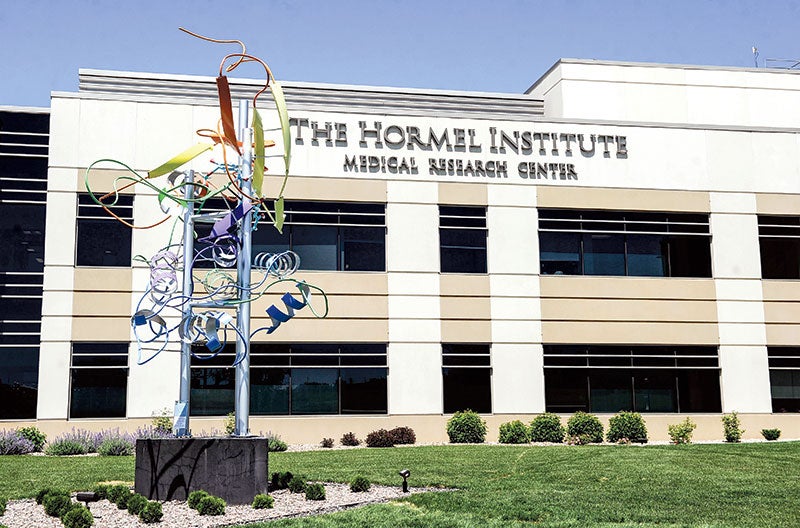Against the odds: Faribault man beats stage four pancreatic cancer
Published 10:10 am Wednesday, April 1, 2015
By Camey Thibodeau
Faribault Daily News
Weight loss and foot pain were the first signs that something was not right with Carl White.
The pain began moving up into his left leg, making it hard to walk, and Carl also noticed that his appetite had waned.
The night before Carl, who was 58 at the time, went to the hospital in July 2013, he and his wife Diane took their grandchildren to the Rice County Fair where Carl had a hard time walking around due to the pain in his foot.
The next day Carl and his wife were supposed to head to their granddaughter’s birthday party, but Carl told Diane to go without him because he didn’t feel well, which was unusual for Carl.
Carl went to the doctor at District One Hospital where blood was drawn and a CAT scan was performed.
Carl was alone when he got the doctor’s heartbreaking news on July 21, 2013.
“The doctor said, ‘I think you have cancer,’” Carl said. “‘You have a spot on your pancreas and several tumors on your liver.’”
He immediately called his wife who arrived at the hospital along with the rest of their family.
Three days later, Carl saw a pancreatic specialist at Mayo Clinic in Rochester who confirmed that he had stage four pancreatic cancer that had spread to his liver.
“When I asked him how much time I had, he said ‘Months, not years. Go home and get your life in order,” said Carl. “We were devastated.”
Doctors gave Carl three to six months to live.
According to the American Cancer Society, for all stages of pancreatic cancer combined, the one-year relative survival rate is 20 percent, and the five-year rate is 6 percent.
“I turned my life over to God. Whatever he had in store for me, it was going to happen,” said Carl. “I just wanted time to get things settled.”
Carl began chemotherapy treatment in Owatonna every two weeks. The drugs he was receiving had just been approved by the U.S. Food and Drug Administration in 2010 and was one of the most difficult regimens to endure. Because Carl was healthy, fit and not elderly, he was a good candidate for the treatment.
Within a year, his blood cell count went from the highest reading they had ever seen to normal levels.
Although doctors advised him to go on disability from the beginning of his treatments, Carl tried to keep working full-time at Crown Cork & Seal in Owatonna but was forced to quit when he nearly bled to death in October 2013.
While undergoing chemotherapy, Carl was taking a prescription blood thinner to prevent blood clots in his legs. Because his blood was so thin, he bled out internally at home and almost died.
“They had to super glue the main artery going up through his stomach,” Diane said. “It was the only way to save his life.”
After Carl was forced to quit working full-time, medical bills kept coming in so his family and friends held a benefit to help with the increasing costs. There was an excellent turnout for the event, which raised more than $10,000.
“It was remarkable to me how many people really cared,” Carl said. “We were getting cards in the mail from friends with $100 in them. My family was helping out in a lot of different ways. Everyone was very, very supportive. It gives you a good incentive to keep going.”
At that point, Carl began setting short-term goals starting with his 40th wedding anniversary in February 2014. After celebrating that milestone with his wife and family, Carl set his sights on his granddaughter’s graduation in June 2014. Again, he reached his goal and maintained hope.
Carl recalled a time when his six-year-old grandson, who was not told that his grandfather had cancer, seemed to somehow know that something was wrong.
“He said ‘I love you, grandpa.’ And I said, ‘I know you do. I love you too.’ Then he said, ‘Even if you die, I love you,’” Carl said.
When Carl went for a checkup in winter 2014, the doctor was having trouble seeing the tumor so they did a PET scan, which also showed nothing.
In February, Carl saw the pancreatic specialist at Mayo Clinic in Rochester who said he and several colleagues had reviewed the scan.
The results were good.
“The doctor said he was in remission,” Diane said. “It can come back but you pray to God it doesn’t.”
The pancreatic specialist’s report from February 2015 said, in part: “(Carl) has had an excellent response to his ongoing chemotherapy. He is one of few patients with complete response to Folfirinox. In the original trial, there was less than one percent of patients with complete response. … the recent PET scan showed no evidence of liver disease …”
The doctor told Carl and Diane that at the Mayo Clinic in Rochester, they had never seen a complete response such as his. The doctors were shocked and one told Carl that he was a miracle.
According to the doctor, Carl was 99.99 percent cancer-free.
Although his doctor gave him the option of stopping chemotherapy treatments in January, Carl opted to continue them for a few months. He’ll receive his last treatment in April, followed by a PET scan. If everything looks good on the scan, he’ll discontinue treatments and be monitored every three months.
Carl is looking forward to the summer and getting back to a normal life.




